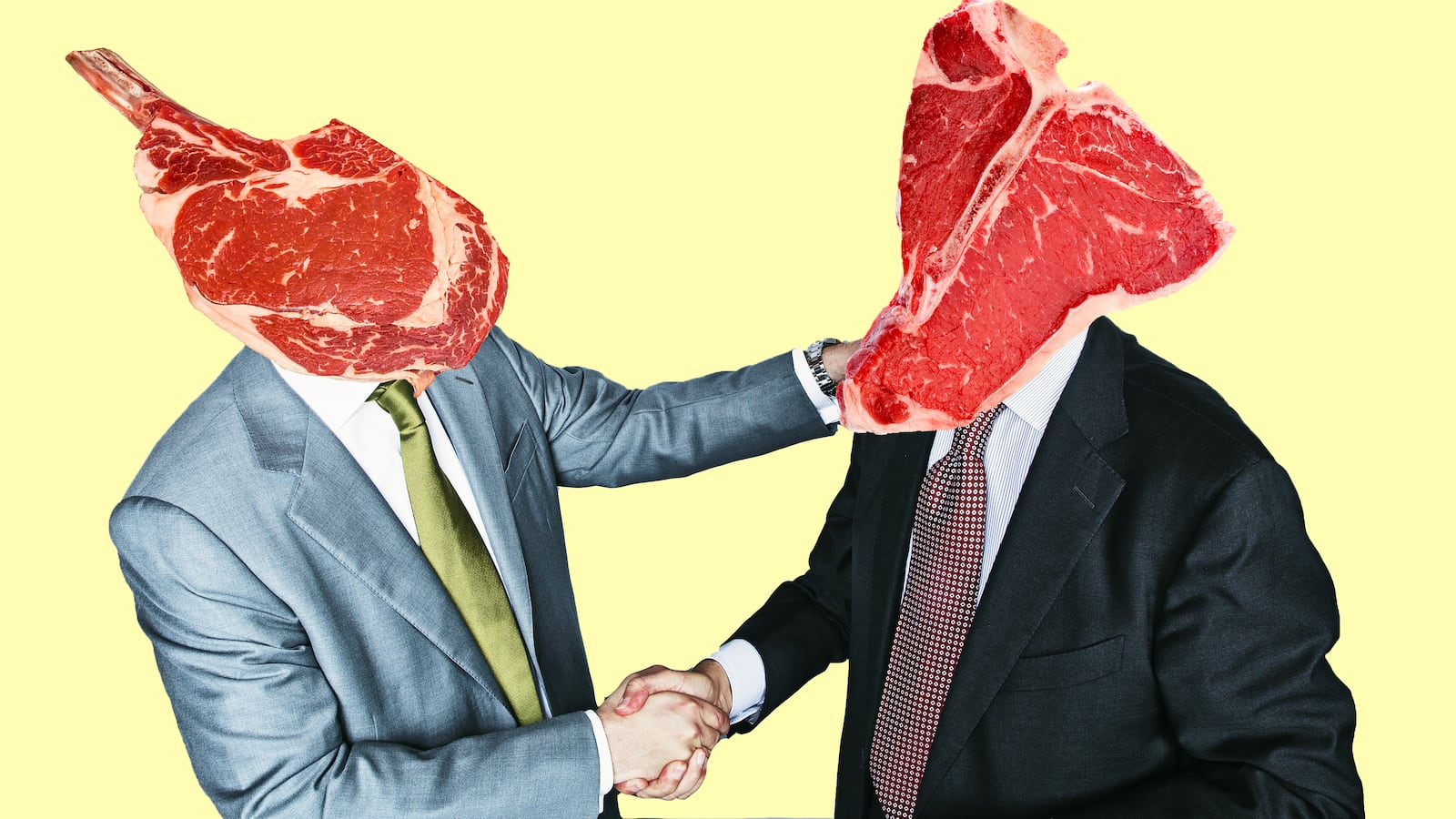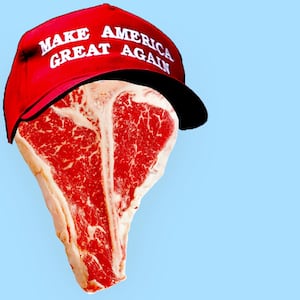On Thursday, devout meat-eaters from across the country will gather in Boulder, Colorado for what’s billed as the nation’s first-ever “Carnivore Conference.”
Devotees are more than just Ron Swanson-style meat fanatics. The carnivore diet, popularized in recent years by the alt-right and bitcoin enthusiasts, requires eating only animal products, and nothing else. Some enthusiasts even avoid high-carb animal products like milk and yogurt.
While the Carnivore Conference is one of the first large-scale gatherings of meat fanatics, the movement has flourished online for years. That’s largely due to a few high-profile meatheads, including controversial dark-web psychologist Jordan Peterson and his daughter Mikhaila (who claims she’s living on a diet of just beef and water), and former orthopedic surgeon Shawn Baker. Both Mikhaila and Baker are slated to speak at the conference.
Mikhaila—who offered Skype consultations on the diet until this Tuesday—says her regimen of beef and water helped her lose weight, rid herself of a crippling autoimmune disease, and alleviated her depression and anxiety; her father says he’s experienced similar weight loss and mental health benefits. Baker credits the diet with vastly improved cardiometabolic health.
Their successes, if true, are certainly worth celebrating. But doctors warn that the science doesn’t back many of their claims—and that some of their recommendations are downright dangerous.
An All-Meat Diet Might Help You Shed Pounds—But It’s Not A Good Idea
There’s one thing that the carnivores have right: If you eat only meat, you’ll probably lose weight. The diet requires cutting out carbs and processed foods, and the high protein content will make you feel full sooner. That’s a perfect recipe for weight loss, said Wajahat Mehal, a professor of medicine at Yale University.
That doesn’t mean it’s a good idea. “I wouldn’t recommend this diet to anybody, to be perfectly honest,” Mehal told The Daily Beast. Adherents wouldn’t get enough fiber, and would likely be deficient in vitamins C and E, he explained.
Caroline Apovian, a professor of medicine at Boston University, agreed with Mehal’s assessment and called the diet a “waste of time.” Sticking to only animal products could put dieters at risk for heart disease, colon cancer, and diabetes, she said, and could negatively impact the bacteria in their colons known as the microbiome.
“When you selectively remove some of the fruits and vegetables from your diet, you have no idea what you’re doing to your microbiome,” Apovian told The Daily Beast. “And it’s pretty clear that you would do a detriment to your body.”
The science doesn’t support the claim that it would help with mental health, either.
There have been some animal studies showing that an extremely low-carb diet reduced anxious and depressive behavior in mice—but that doesn’t mean it would do the same in humans. A meta-analysis of the link between meat consumption and depression published in BMC Psychiatry in 2017 found the opposite—that meat consumption was positively correlated with depression—although the authors cautioned that their findings were limited by the lack of studies.
In a statement to The Daily Beast, Mikhaila reiterated her success on the diet. “Eating only beef (which is what we're doing, not all animal products), hasn't deprived us of any nutrients or vitamins in the last year and I have extensive bloodwork to prove it. So maybe some of these ‘many doctors’ would like to give a timeline of when these supposed deficiencies occur,” she wrote. “Because if it's ‘well at some point in the future,’ that isn't very useful. I figure if I don't have a deficiency in 14 months, it probably isn't going to happen.”
And while she acknowledged that there haven’t been any extensive studies proving the diet’s efficacy, Mikhaila defended her choice to speak at a conference about it. “I'm not going to sit idly by and not say anything when something as ridiculous as an all-beef diet solved my autoimmune problems, depression, chronic fatigue, and most likely saved my life,” she wrote.
Baker offered a similar rationale: “In the end no one is seeing any actual deficiencies and this is consistent with what we observed with historic populations that were on largely to almost exclusive meat based diets,” Baker said in an emailed statement to The Daily Beast. (Some studies have cast doubt on the claim that our ancestors ate a meat-heavy diet). “Regardless, even if someone were to have a dietary need for some nutrient there is no prohibition from obtaining it from either organ meats or plants as needed, it’s not a dogma or religion as we see among the vegans.”
It’s Really Bad for The Environment
One of the most common arguments for eating less meat is to help protect the environment. Environmental advocates argue that animal agriculture takes up an immense amount of land, generates toxic air and water pollution, and contributes more than its fair share of greenhouse gases.
Shawn Baker doesn’t agree. In an attempt to defend his fellow carnivores from claims that a meat-heavy diet is bad for the planet, Baker posted a YouTube video this August called “Carnivore Diet-Environment and the vegan propaganda.”
The video focused entirely on debunking the claim that animal agriculture emits more greenhouse gases than growing plants. Citing EPA data, Baker claimed that while the transportation sector emits 26 percent of the country’s greenhouse gases, animal agriculture only emits 4 percent.
“If we put that on a worldwide scale, if you and I and every American—all 330 million of us—gave up eating meat, and all the animals were magically gone from the planet, the environmental impact worldwide on greenhouse gases would be something like 0.3 percent. An incredibly small amount. It makes very little difference,” Baker said. “So for anyone to tell you that the most ecologically friendly thing you can do is not eat meat is ridiculous.”
“[Vegans] are basically lying to you, and guilting you into thinking you’re hurting the environment,” Baker added. “Don’t let these people get out there and tell you that you’re evil, or that you’re hurting the environment, or any of this other B.S. Because that’s what it is—it’s BS.”
The science says otherwise. To be fair, it’s extremely hard to conclusively prove that Baker’s wrong when it comes to greenhouse gas emissions. While studies, like this Feb. 2019 report in the journal Science that suggests that meat and dairy comprise 60 percent of greenhouse gas emissions, contradict him, it’s nearly impossible to measure every relevant factor (feed, transportation, machinery) to understand the absolute emissions of a given food product.
But one thing is clear: A meat-heavy diet, and the factory farming it supports, is terrible for the environment in myriad other ways. Antibiotic resistance. Toxic pools of animal waste. Deforestation. The situation is so dire that in 2017, a group of 200 leading health experts sent a letter to the WHO, urging the organization to appoint a director who understood that industrial animal farming practices “undermin[e] the highest attainable level of health that is the WHO’s mandate.”
Baker downplayed these environmental concerns. “Clearly more things can be done to continue to improve the process both from a welfare standpoint and an environmental damage mitigation standpoint,” he wrote in the emailed statement, “but ultimately the claim that cows are the prime driver of environmental damage is patently false and only serves to distract us from the much larger issues of fossil fuels—do we sacrifice our nutrition or do we sacrifice our comfort?”
There’s No Need to Worry About “Anti-Nutrients”
Many devout carnivores claim they have a good reason for avoiding vegetables: “anti-nutrients.” Anti-nutrients, proponents claim, are toxic compounds found in plants and grains that block the body’s absorption of critical vitamins and minerals, that they say can lead to heart disease, autoimmune disorders, and diabetes.
Apovian thinks that’s ridiculous. She acknowledged that “antinutrients” certainly exist—noting that the nutritional community uses less fearmonger-y words like “phytonutrients”—but said that for the average person, there’s nothing to worry about.
There’s no rigorous evidence that antinutrients—unless in massively large, irregular doses—would negatively impact a person’s health, she explained. What’s more, many of those anti-nutrients are broken down when the vegetable is cooked.
The term is particularly harmful, she added, because it gives those nutrients a bad rap they don’t deserve. Glucosinolates in vegetables like kale and broccoli, for example, are technically “antinutrients” (although they’re broken down by cooking)—but they also have cancer-fighting properties. The phytic acid in beans and whole grains can help lower blood sugar and cholesterol.
“You don’t want to start avoiding beans and whole grains and kale that are actually really really healthy to eat,” she said, adding that “this is just another fad diet that could actually be very harmful to people.”







